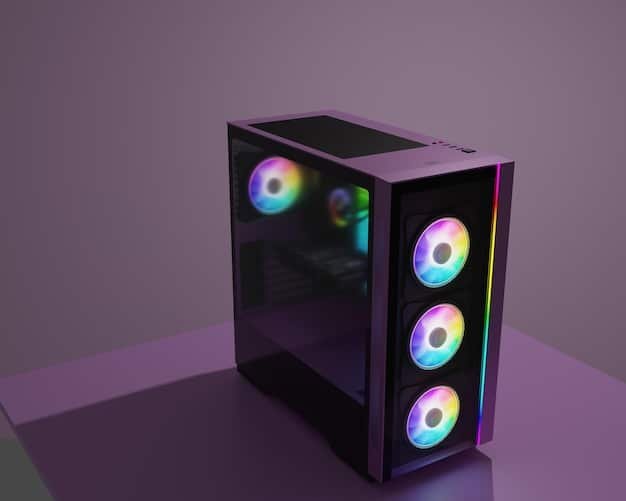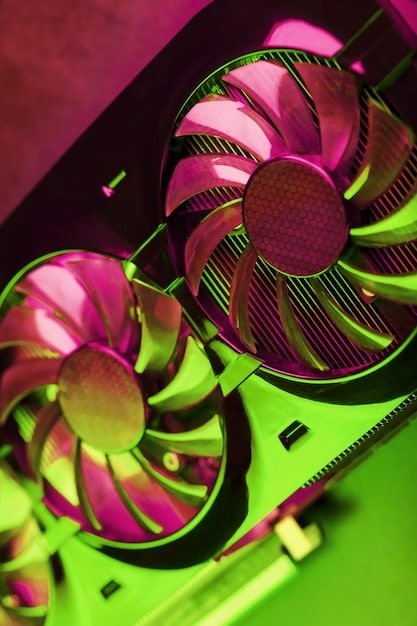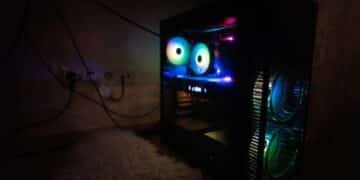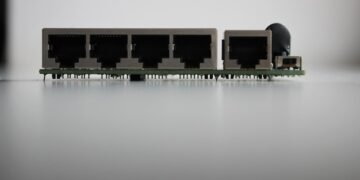The Ultimate Guide to PC Cooling: Selecting the Best Solution in 2025

Choosing the right PC cooling solution is crucial for maintaining optimal performance and extending the lifespan of your components; this guide explores various cooling options, from air coolers to liquid cooling systems, enabling you to make an informed decision in 2025.
Investing in proper The Ultimate Guide to PC Cooling: Choosing the Right Solution for Your Needs in 2025 is critical for system stability and longevity, given the increasing demands on modern CPUs and GPUs; understanding your options is the first step in safeguarding your investment and ensuring peak performance.
Understanding the Basics of PC Cooling
PC cooling is essential to dissipate the heat generated by components like the CPU and GPU, ensuring they operate within safe temperature limits. Without adequate cooling, these components can overheat, leading to performance throttling, instability, and even permanent damage.
Different cooling solutions cater to various needs, from basic air coolers for everyday use to advanced liquid cooling systems for high-performance gaming and overclocking. Understanding these options and their applications is vital for building a reliable and efficient PC.
Why is PC Cooling Important?
Effective PC cooling prevents overheating, which can cause performance degradation and system instability. High temperatures can shorten the lifespan of your components, making investing in a good cooling solution a wise decision.
Common Cooling Problems and Solutions
Common cooling issues include dust buildup on fans and heatsinks, inadequate airflow inside the case, and thermal paste degradation. Regularly cleaning your system and reapplying thermal paste can resolve these problems.
- Dust Buildup: Regularly clean fans and heatsinks to maintain airflow.
- Inadequate Airflow: Ensure proper case ventilation with strategically placed fans.
- Thermal Paste: Replace dried or degraded thermal paste for optimal heat transfer.
Proper PC cooling is not just about lowering temperatures; it’s about maintaining system stability and extending the life of your components, making it a critical aspect of PC building and maintenance. Ignoring cooling can lead to costly hardware failures and frustrating performance issues.
Air Cooling: A Reliable and Affordable Option
Air cooling is the most common and affordable PC cooling method, utilizing heatsinks and fans to dissipate heat. It’s a straightforward solution that can effectively cool most CPUs and GPUs, making it ideal for general-purpose PCs and budget-conscious builds.
Different types of air coolers exist, each offering varying levels of performance and noise. Tower coolers, for example, provide excellent cooling capacity and are suitable for overclocking, while low-profile coolers are designed for compact systems.

Types of Air Coolers
Air coolers come in various designs, including top-down coolers, tower coolers, and low-profile coolers. Each type offers a unique combination of performance, size, and noise levels.
Advantages and Disadvantages of Air Cooling
Air cooling is affordable, reliable, and easy to install, but it can be bulky and less efficient than liquid cooling. It’s also generally louder, especially under heavy loads.
- Advantages: Affordable, reliable, easy to install.
- Disadvantages: Can be bulky, less efficient than liquid cooling, louder.
- Best For: General-purpose PCs, budget-conscious builds.
Air cooling remains a solid choice for many PC users, offering a balance between cost, performance, and ease of use. While it may not match the cooling capacity of liquid cooling, it’s a dependable solution that can keep your components running smoothly.
Liquid Cooling: The High-Performance Solution
Liquid cooling offers superior heat dissipation compared to air cooling, making it ideal for high-performance gaming rigs and overclocked systems. It uses a liquid coolant to transfer heat away from components, allowing for lower temperatures and quieter operation.
Liquid cooling systems can be either all-in-one (AIO) coolers or custom loops. AIO coolers are self-contained units that are easy to install, while custom loops offer maximum performance and customization options but require more expertise and maintenance.
AIO vs Custom Loops
AIO coolers are pre-built and easy to install, while custom loops allow for greater customization and performance. Custom loops, however, require more maintenance and technical knowledge.
Advantages and Disadvantages of Liquid Cooling
Liquid cooling offers excellent cooling performance and quieter operation but is more expensive and complex than air cooling. It also carries the risk of leaks, though AIO coolers minimize this risk.

- Advantages: Excellent cooling performance, quieter operation.
- Disadvantages: More expensive, complex, risk of leaks (custom loops).
- Best For: High-performance gaming PCs, overclocked systems.
Liquid cooling is the top choice for enthusiasts who demand the best possible cooling performance and aesthetics. While it requires a greater investment and some technical know-how, the benefits in terms of temperature and noise reduction are well worth it for those pushing their systems to the limit.
Factors to Consider When Choosing a Cooling Solution
Selecting the right PC cooling solution involves several factors, including your budget, the components you’re cooling, and your performance goals. Understanding these factors ensures you choose a solution that meets your specific needs and provides optimal cooling performance.
Consider the thermal design power (TDP) of your CPU and GPU, the size and layout of your PC case, and your tolerance for noise. These considerations will help you narrow down your options and make an informed decision.
TDP of Your Components
The TDP of your CPU and GPU indicates how much heat they generate, influencing the cooling capacity you need. Choose a cooler that can handle the TDP of your components to ensure effective cooling.
Case Size and Airflow
The size and layout of your PC case affect airflow, impacting the efficiency of your cooling solution. Ensure your case has adequate ventilation and consider the cooler’s dimensions to ensure it fits properly.
Choosing the right PC cooling solution is a balance of performance, budget, and compatibility. By considering these factors, you can ensure your components remain cool and perform optimally, regardless of the demands placed upon them.
Maintaining Your PC Cooling System
Regular maintenance is crucial for ensuring the long-term performance and reliability of your PC cooling system. Dust buildup, thermal paste degradation, and liquid leaks can all compromise cooling efficiency, leading to overheating and potential component damage.
Cleaning your system regularly, reapplying thermal paste as needed, and inspecting liquid cooling systems for leaks can prevent these issues and keep your components running smoothly. A little maintenance goes a long way in preserving the life of your PC.
Cleaning and Dust Removal
Dust buildup can impede airflow and reduce cooling efficiency. Use compressed air to clean fans, heatsinks, and other components regularly.
Thermal Paste Replacement
Thermal paste dries out over time, reducing its ability to transfer heat. Reapply thermal paste every 1-2 years for optimal performance.
- Frequency: Clean every 3-6 months.
- Tools: Compressed air, soft brush.
- Frequency: Reapply every 1-2 years.
Maintaining your PC cooling system is a straightforward process that can significantly extend the life of your components and ensure consistent performance. By following these simple steps, you can keep your system running cool and quiet for years to come.
Future Trends in PC Cooling Technology
The future of PC cooling is marked by advancements in materials, designs, and technologies aimed at improving heat dissipation and reducing noise. Innovations like vapor chamber coolers, graphene-based thermal interfaces, and advanced liquid cooling solutions promise to push the boundaries of thermal management.
As components become more powerful and generate more heat, the demand for innovative cooling solutions will continue to grow, driving further advancements in the field. Expect to see more efficient, quieter, and more compact cooling systems in the years to come.
Emerging Cooling Technologies
Vapor chamber coolers, graphene-based thermal interfaces, and advanced liquid cooling solutions are emerging technologies poised to revolutionize PC cooling.
The Role of Software in Cooling Management
Software plays an increasingly important role in managing PC cooling, allowing users to monitor temperatures, adjust fan speeds, and optimize cooling performance. Advanced software can even predict thermal events and prevent overheating.
The evolution of PC cooling technology is driven by the need to manage increasingly powerful components while maintaining system stability and minimizing noise. These emerging trends promise to deliver more efficient and effective cooling solutions, ensuring PCs can handle the demands of tomorrow.
| Key Point | Brief Description |
|---|---|
| 🌡️ Cooling Importance | Prevents overheating, enhancing component lifespan and performance. |
| 💨 Air Cooling | Affordable and reliable, ideal for general use and budget builds. |
| 💧 Liquid Cooling | Offers superior performance and quieter operation for high-end systems. |
| 🛠️ Maintenance | Regular cleaning and thermal paste replacement maintain cooling efficiency. |
FAQ
▼
PC cooling is crucial because it prevents overheating, which can lead to performance throttling, system instability, and component damage. Keeping your components cool ensures they operate efficiently and last longer.
▼
Air cooling is suitable for most general-purpose PCs and budget builds, offering a balance of cost and performance. Liquid cooling is better for high-performance gaming rigs and overclocked systems, providing superior cooling efficiency.
▼
You should clean your PC cooling system every 3-6 months to remove dust buildup, which can impede airflow and reduce cooling efficiency. Regular cleaning helps maintain optimal thermal performance.
▼
Thermal paste should be replaced every 1-2 years, as it dries out over time, reducing its ability to transfer heat efficiently. Replacing it ensures optimal heat transfer between the CPU and cooler.
▼
Liquid cooling offers superior heat dissipation and quieter operation compared to air cooling. It allows for lower temperatures, which can improve performance and stability, especially in high-performance systems.
Conclusion
Choosing the right PC cooling solution is a critical decision that impacts the performance, stability, and longevity of your system. Whether you opt for the affordability and reliability of air cooling or the superior performance of liquid cooling, understanding your needs and the available options is key to making an informed choice. Regular maintenance ensures your cooling system continues to perform optimally, keeping your components running smoothly for years to come. As technology advances, expect to see further innovations in PC cooling, offering even more efficient and effective solutions for thermal management.





